中考英语二轮语法专项复习课件 第10讲 短语动词及动词辨析
文档属性
| 名称 | 中考英语二轮语法专项复习课件 第10讲 短语动词及动词辨析 |
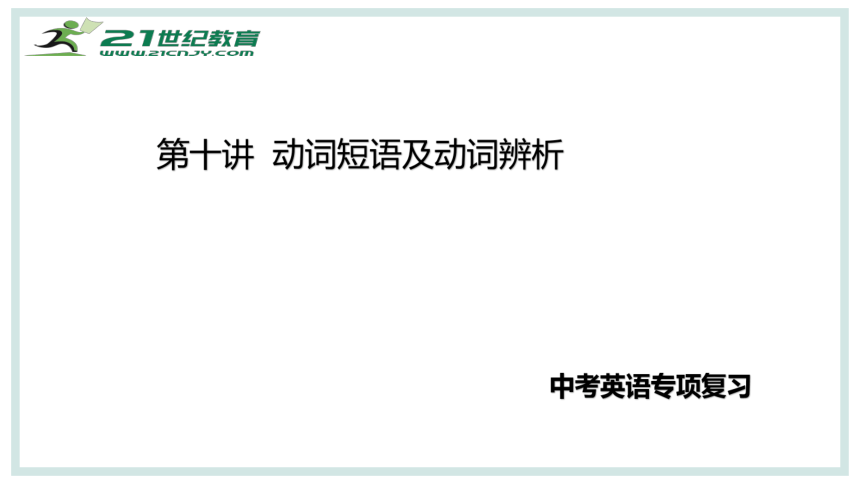
|
|
| 格式 | pptx | ||
| 文件大小 | 1.5MB | ||
| 资源类型 | 试卷 | ||
| 版本资源 | 鲁教版 | ||
| 科目 | 英语 | ||
| 更新时间 | 2023-12-24 09:55:28 | ||
图片预览

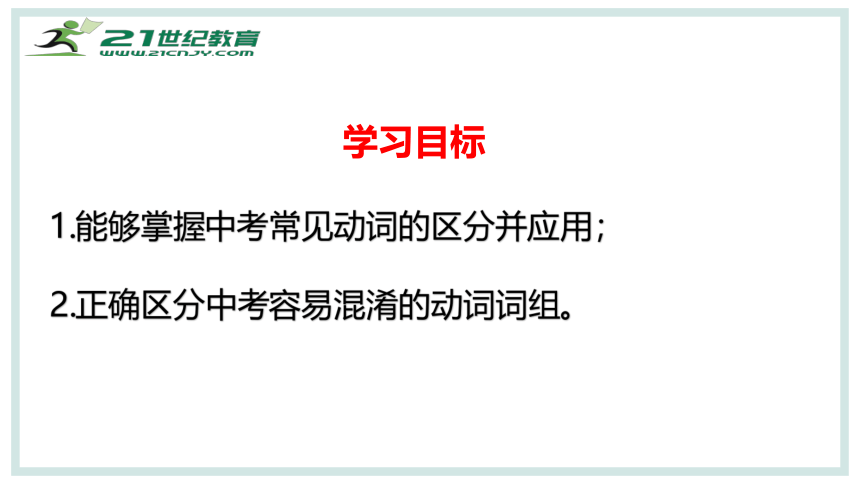
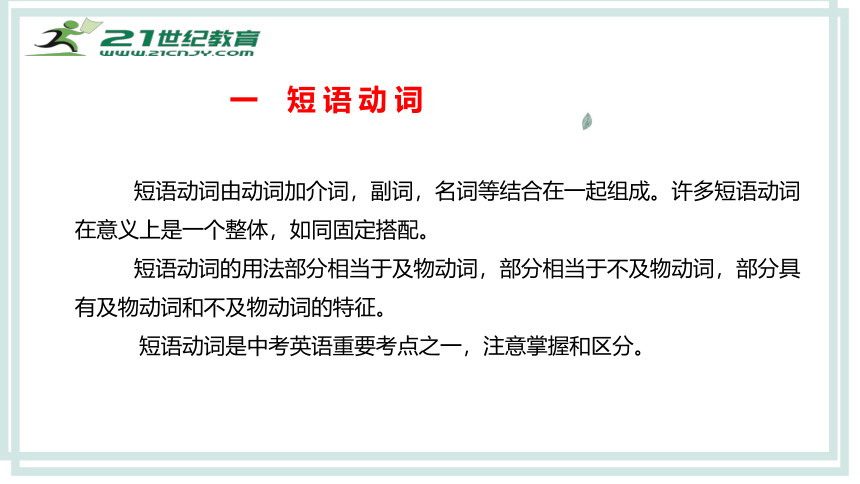
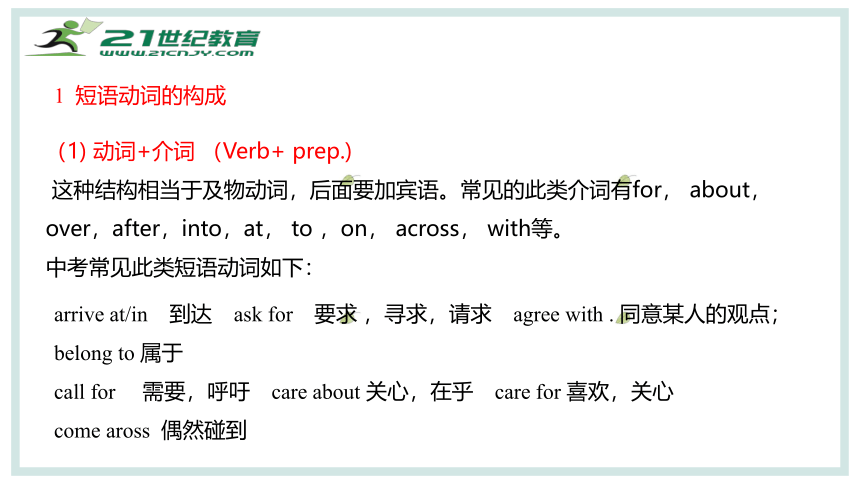
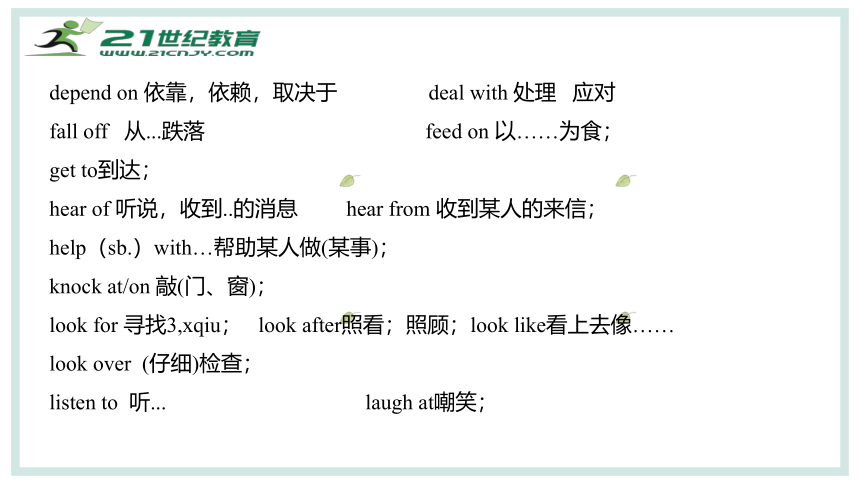
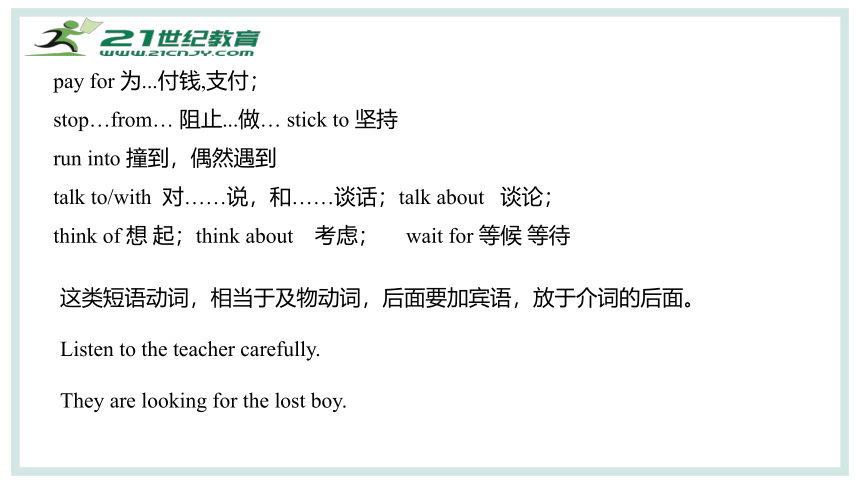
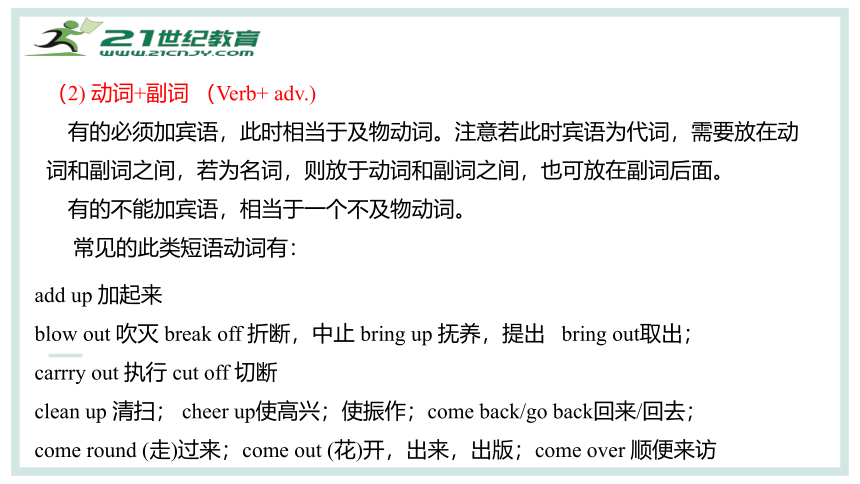
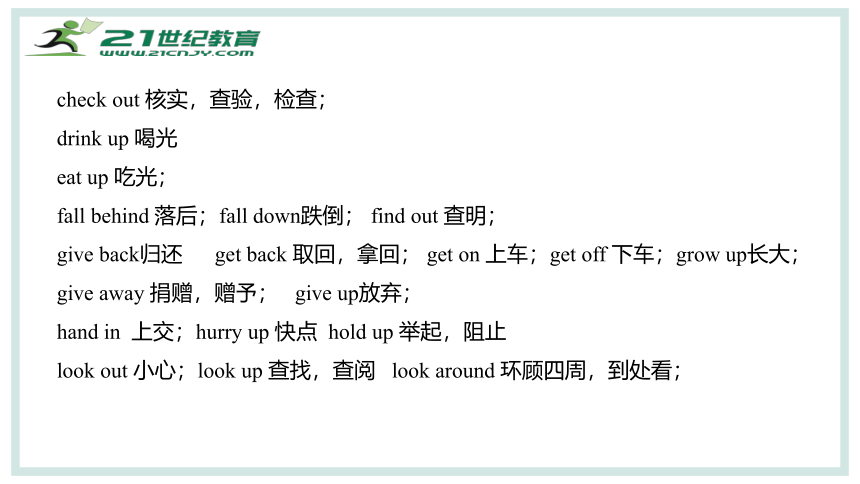
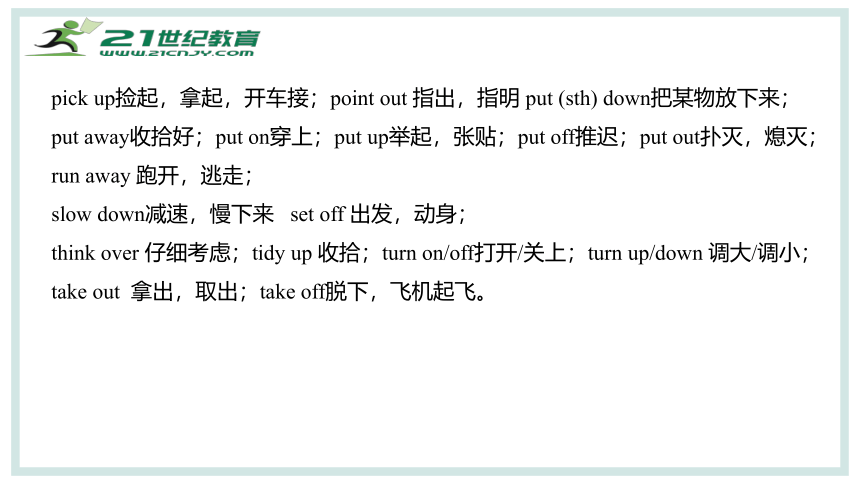
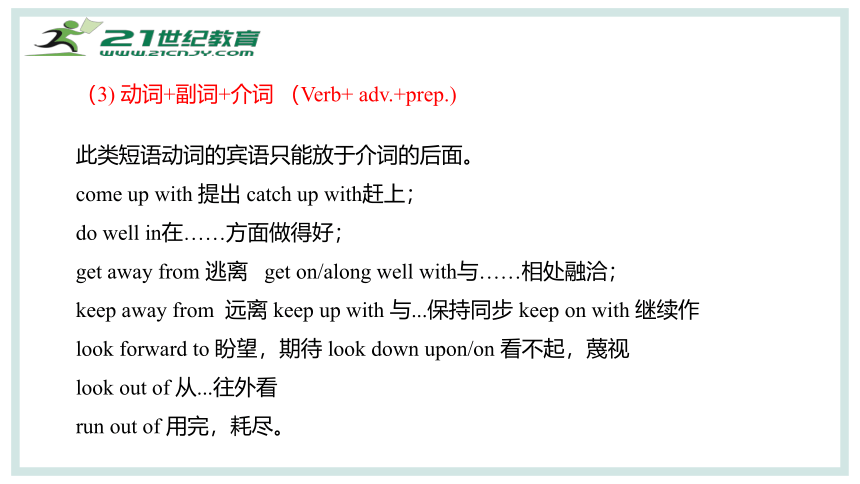
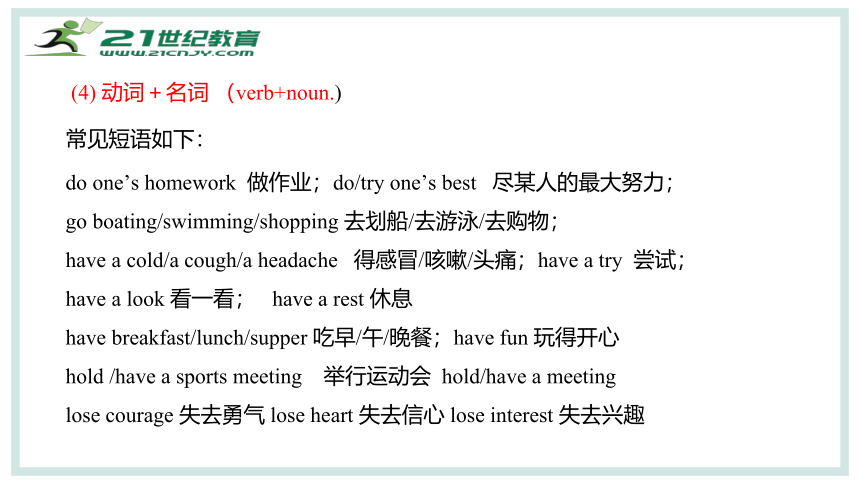

文档简介
(共60张PPT)
第十讲 动词短语及动词辨析
中考英语专项复习
1.能够掌握中考常见动词的区分并应用;
2.正确区分中考容易混淆的动词词组。
学习目标
一 短 语 动 词
短语动词由动词加介词,副词,名词等结合在一起组成。许多短语动词在意义上是一个整体,如同固定搭配。
短语动词的用法部分相当于及物动词,部分相当于不及物动词,部分具有及物动词和不及物动词的特征。
短语动词是中考英语重要考点之一,注意掌握和区分。
1 短语动词的构成
(1) 动词+介词 (Verb+ prep.)
这种结构相当于及物动词,后面要加宾语。常见的此类介词有for, about,over,after,into,at, to ,on, across, with等。
中考常见此类短语动词如下:
arrive at/in 到达 ask for 要求 ,寻求,请求 agree with . 同意某人的观点;
belong to 属于
call for 需要,呼吁 care about 关心,在乎 care for 喜欢,关心
come aross 偶然碰到
depend on 依靠,依赖,取决于 deal with 处理 应对
fall off 从...跌落 feed on 以……为食;
get to到达;
hear of 听说,收到..的消息 hear from 收到某人的来信;
help(sb.)with…帮助某人做(某事);
knock at/on 敲(门、窗);
look for 寻找3,xqiu; look after照看;照顾;look like看上去像……
look over (仔细)检查;
listen to 听... laugh at嘲笑;
pay for 为...付钱,支付;
stop…from… 阻止...做… stick to 坚持
run into 撞到,偶然遇到
talk to/with 对……说,和……谈话;talk about 谈论;
think of 想 起;think about 考虑; wait for 等候 等待
这类短语动词,相当于及物动词,后面要加宾语,放于介词的后面。
Listen to the teacher carefully.
They are looking for the lost boy.
文本信息
标题数字等都可以通过点击和重新输入进行更改。文字数字大小颜色参考此模板
(2) 动词+副词 (Verb+ adv.)
有的必须加宾语,此时相当于及物动词。注意若此时宾语为代词,需要放在动词和副词之间,若为名词,则放于动词和副词之间,也可放在副词后面。
有的不能加宾语,相当于一个不及物动词。
常见的此类短语动词有:
add up 加起来
blow out 吹灭 break off 折断,中止 bring up 抚养,提出 bring out取出;
carrry out 执行 cut off 切断
clean up 清扫; cheer up使高兴;使振作;come back/go back回来/回去;
come round (走)过来;come out (花)开,出来,出版;come over 顺便来访
check out 核实,查验,检查;
drink up 喝光
eat up 吃光;
fall behind 落后;fall down跌倒; find out 查明;
give back归还 get back 取回,拿回; get on 上车;get off 下车;grow up长大;
give away 捐赠,赠予; give up放弃;
hand in 上交;hurry up 快点 hold up 举起,阻止
look out 小心;look up 查找,查阅 look around 环顾四周,到处看;
pick up捡起,拿起,开车接;point out 指出,指明 put (sth) down把某物放下来;put away收拾好;put on穿上;put up举起,张贴;put off推迟;put out扑灭,熄灭;
run away 跑开,逃走;
slow down减速,慢下来 set off 出发,动身;
think over 仔细考虑;tidy up 收拾;turn on/off打开/关上;turn up/down 调大/调小;
take out 拿出,取出;take off脱下,飞机起飞。
(3) 动词+副词+介词 (Verb+ adv.+prep.)
此类短语动词的宾语只能放于介词的后面。
come up with 提出 catch up with赶上;
do well in在……方面做得好;
get away from 逃离 get on/along well with与……相处融洽;
keep away from 远离 keep up with 与...保持同步 keep on with 继续作
look forward to 盼望,期待 look down upon/on 看不起,蔑视
look out of 从...往外看
run out of 用完,耗尽。
(4) 动词+名词 (verb+noun.)
do one’s homework 做作业;do/try one’s best 尽某人的最大努力;
go boating/swimming/shopping 去划船/去游泳/去购物;
have a cold/a cough/a headache 得感冒/咳嗽/头痛;have a try 尝试;
have a look 看一看; have a rest 休息
have breakfast/lunch/supper 吃早/午/晚餐;have fun 玩得开心
hold /have a sports meeting 举行运动会 hold/have a meeting
lose courage 失去勇气 lose heart 失去信心 lose interest 失去兴趣
常见短语如下:
lose weight 减肥
make a decision作出决定; make sense 讲得通 make the bed
整理床铺 make faces 作鬼脸
make a mistake/mistakes犯错 make friends交朋友;make a noise吵闹;
make money赚钱
play chess下象棋;
take actions take advice 征求意见 take breath 歇口气 take care 当心
take one’s time 慢慢来
take place 发生take turns轮流;take photos照相;take place发生。
(5) 动词+名词 +介词(verb+noun+prep.)
此类短语动词的宾语要放于介词后面,常见的此类短语动词有:
take care of 照顾,give thanks to 向某人表示感谢;
pay attention to 注意 make peace with 与...讲和
say goodbye/hello/sorry to 向某人道别/打招呼/道歉;
make use of 使用,利用 make friends with 和某人交朋友
make fun of 取笑; make preparation for 为...作准备
make progress in 在...方面进步 make room for 为..腾空
take pride in为……感动骄傲/自豪 take advantage of 利用
take part in 参加
输入文本信息
标题数字等都可以通过点击和重新输入进行更改。文字数字大小颜色参考此模板
标题数字等都可以通过点击和重新输入进行更改。文字数字大小颜色参考此模板
(6) 动词+介词 +名词(verb+prep.+noun)
①动词后要带宾语的:
bring... to an end 把...结束 bring....under control 把...控制
keep... in mind 记住... keep ... in touch 使...保持联系
learn...by heart 背熟
②动词后面不能带宾语的:
come into power 掌权,执政 go to bed 去睡觉
put on weight 长胖 keep/stay in touch 保持联系
get in touch 取得联系
(7) 动词+形容词
常见的有leave... open(让...开着), set ....free(把...释放,把...放走),
cut ....open(把...切开)等。
这类短语动词的宾语如果是名词,则宾语可放在形容词的前边,也可放在后边;宾语如果是人称代词或反身代词,则必须放在形容词前边。
如:
leave the window open 让窗户开着
She cut it open.
输入标题文本信息
标题数字等都可以通过点击和重新输入进行更改。文字数字大小颜色参考此模板
二 常见动词和动词词组的用法辨析
1、say, speak, talk, tell的用法辨析
(1) say 说,讲,表示讲话,侧重语强调说话的内容,后加宾语或宾语从句, 。如:
say (sth) to sb 对某人说(某事)
He said thanks to the young man
He said he was very tired
“I’m leaving at once” Tom said to me.
(2) speak 讲话,或发表讲话,发言,还有说某种语言用speak。speak to sb与某人说话。如:
He will speak at the meeting. 他会在会上讲话
Can you speak French?
May I speak to Mr. Smith, please
(3) talk表示“谈话,交谈”,与to, about, with等连用,才可以接宾语。
talk to/with sb. 同某人谈话 talk about sth 谈论某事,如:
Can I talk to/with you for a minute?
What are you talking about
(4) tell 表示“告诉,讲述”,讲给对方听。后面可以带双宾语(tell sb. sth./tel sth. to sb. ) 或 tell sb to do sth 或 tell sb that+句子。tell 还有“辨别,分辨”之意
Can you tell me a story?=Can you tell a story to me?
My teacher told me that we would have a test next week.
Can you tell (辨别)the difference between these two products?
2、look, see, watch和read的用法辨析
(1) look 强调“看”这个动作,因为是不及物动词,所以表示看人或物时,需要加介词 at ,然后再加某人或某物作宾语。注意:look还可以作系动词,后接形容词作表语,表示“看起来…
Look! The boy is swimming in the river.
Look at my new toy
(2) see 看到,看见。指“看见”某物, 某人,强调的是结果。也可用于看电影、看戏剧,看展览等, 也有看望,拜访,明白之意
I saw a cat on my home home.
see a film 看电影 see friends看望朋友
(3) watch 指的是“观看”,“注视”之意,有意识地看。多指感兴趣地看某物,常用于看电视、看比赛等
He likes watching football matches
(4)read 阅读,看 。可直接接阅读的对象。主要用于看书、看报纸、看杂志、看小说,看信等与纸张类有关的带有文字内容的东西。
read a book看书,读书 read a magazine看杂志 read a newspaper看报纸
点击此处
输入文本信息
3、borrow, lend和keep的用法辨析
borrow“借;借入或借他人的东西供自己使用”。一般与介词from连用,其常用的固定搭配为borrow sth from sb“向某人借某物”。是非延续性动词,表示瞬间即能完成的动作。
I borrowed a book from Jim.
lend意为“借出”,把自己的物品借给他人使用,其常用搭配为lend sth to sb或lend sb sth“借给某人某物”。同borrow一样,是非延续性动词,只表示瞬间即能完成的动作
Jim lent a book to me=Jim lent me a book.
keep意为“保存;保留”,属于延续性动词,与表示一段时间的状语连用。
例如:You can keep this book for one month.这本书你可以保留一个月。
4、bring, take, carry, get作“拿,带”的用法辨析
(1) bring意思为“拿来”、“带来”,具有方向性,指把人或某个东西从另一个地方带到说话者所在的地方。
常用短语:bring sb sth
bring sth./sb. to /sb.sp(某地)。指将某物或某人从别处“带过来”。
bring sth./sb. here
Bring me the book, please. = Bring the book to me.
(3)carry 意为“拿;提;扛”不具有方向性。可指随身携带,还有背着、扛着、抱着、提着的含义,不表明来去的方向。
Carrying the box is difficult for me, can you help me?
Do you always carry a handbag
(2). take意为“拿走;带走”是bring的反义词,指把某人或某个东西从说话者的地方带到另一个地方去.
常用短语:take sb./sth. to sb./someplace。
I will take the umbrella to Lily, she forgot it this morning.
(4)get 意为“去取来;去拿来”,指双向性,指某人到某地去把某人或某物带来或拿来
【总结】carry无方向性,take与bring都是单方向,是一对反义词。take是拿走bring是拿来,get双方向,是去拿来
5 wear, put on,in和dress表示穿的用法辨析,
(1)wear强调的是状态,意思是“穿着/戴着”。可用于穿衣服、穿鞋、戴帽子、戴手套、佩戴首饰等。
He wears a white T-shirt today.他今天穿着一件白色的体恤衫。
My teacher wears glasses我的老师戴眼镜。
(2)put on 强调的是动作,“穿上”“戴上”的意思。可以用于穿衣服、穿鞋、戴帽等。侧重于穿戴的动作。
It's time to have class, I put on my clothes quickly and run out.
上课时间快到了,我迅速穿上衣服跑了出去。
点击此处
输入文本信息
(3)in 表示“穿着……颜色的衣服”,后加颜色或衣物。
The woman in red is my mother.
The boy in a blue jacket is my brother
She looked so beautiful in her wedding dress.
(4)dress 作动词,表示“穿着...衣服”, 还有有“穿着”“打扮”的意思。作“穿着”解时,只用于穿衣服,不用于穿鞋、戴帽、戴手套。常常与in和get搭配——dress in/get dressed
They got dressed and went to school.他们穿好衣服后去了学校。
Mary dresses in purple today.Mary今天穿着紫色的衣服。
作及物动词不可以单独使用,后面要接宾语,其宾语通常加人,构成:dress+宾语(一般为“人”)
Could you dress my baby daughter 你可以给我小女儿穿下衣服吗?
作不及物动词时,可以单独使用,表示“穿好衣服”,。
The man dressed and drove out.这个男人穿好衣服,开车出去了。
6、take, spend, pay和cos作花费的用法辨析
(1)take 以物作主语,表示“花”时间,句型结构为:
It takes/took/will take (sb.)+时间+to do sth.意为“做某事花费某人多少时间”,其中,it是形式主语,不定式短语to do sth.为真正的主语。
It took me two days to finish the work.
(2)spend以人作主语,可表示“花”时间或金钱,句型结构为:
“sb.spend some time/money(in )doing sth.
“sb.spend some time/money on sth.
I spent two hours finishing my homework yesterday
He didn’t spend much time on his lessons.
(3)pay的主语为人,后常跟介词for,句型结构为:
sb.pay money for sth. 某人花了……钱买某物”
sb.pay for sth. 某人为…付钱”
She paid ten dollars for the magazine
(4)cost主语是物,宾语主要表示“花”金钱,也可是时间、力气。句型结构为:
sth.+cost+sb.+money 某物花了某人多少钱”
sth.cost money 某人值……钱”
The book cost me 30 yuan.
相关短语搭配:the cost of以…为代价 low cost低成本,廉价的
production cost生产成本 at the cost of以…为代价
②表示允许。
You may come if you wish.
③表示推测,可能性, 通常用于肯定句,不用于问句中,可能性比can小。
Mary may know my phone number.
Your mother may know the truth.
④表示祝愿。
May you have a good time
May you be happy.
7、reach, get 和arrive表到达的用法辨析
(1) reach是及物动词,多强调经过很长的时间或费了很大的力气之后到达某地。后面要直接跟表示地点的名词作宾语,即reach+地点
The marathon runner was very tired, but she did not stop until she reached the finish line.
reach the top of a mountain
(2) get是不及物动词,常与to连用,再接名词,即get to+地点。但需要注意,后面接表示地点“home、here” 或者 “there”的副词时,不用to。
What time will you get home today
Could you tell me how to get to the nearest bus stop
(3)arrive 是不及物动词在说明 “到达” 一个具体目的地时,应根据目的地的大小来选择后面接的介词。“arrive” 后要加介词 “in” 或 “at”,再加地名。
即表示 “到达较大的地点” 时用 “arrive in”,
表示 “到达较小的场所” 时用 “arrive at”
arrive in the UK(抵达英国)arrive at the supermarket(到达超市)
My mum arrived in the UK three hours ago. She should’ve arrived at her hotel by now.
我妈妈三个小时前到达了英国。她现在应该已经到酒店了。
8、accept和receive的用法辨析
(1) receive 通常指被动地“收到”或“接到”,指客观上的接受,接受这种行为和动作。注意表示“接见”、“接待”时,要用 receive 而不用 accept。
We haven’t received his letter for a long time.
He received the result of the job interview quickly
(2) accept 则指主动地“接受”,主观上自愿主动去接受、接纳。accept后面可接如想法,表扬,批评,道歉等。
She received his present, but she didn’t accept it.
她收到了他的礼物,但是没有接受
9、join, join,take part in和attend的用法辨析
(1) join 指加入某个党派、团体、组织等,并成为其中一员。
其常用短语有:join the Army/the Party/the League参军/入党/参团。
join sb. in (doing) sth. 和某人一道做某事
My younger sister joined me in cleaning the bedroom.
(2)join in:多指参加小规模的活动如“游戏、比赛”, 多用于口语
Can I join in the game
(3)take part in:指参加会议或群众性活动,着重说明主语参加该项活动并在活动中发挥积极作用。常用句型为:take an active part in
How many countries will take part in the World Cup
(4)attend: 正式用语,常指参加会议, 婚礼,葬礼,典礼,去上课,听报告讲座等。
Don’t worry. I will attend the important meeting on time
10、die, dead, death和dying的用法辨析
(1) die是动词,意为“死,去世”,过去式died,过去分词died,现在分词dying。die为短暂性动词,不能与一段时间的延续性时间连用(表示延续性状态的时候用be dead)。
The old man died four years ago.
The old mad has been dead for 4 years.
(2) dead是形容词,意为“死的”,,表示的是一种状态。
.The poor man is dead. 这个可怜的人死了
(3) death是名词,意为“死(亡)”。在句中经常充当主语或宾语。
Death is something that we can’t avoid in the future.死亡是我们在以后避免不了的事情。
(4) dying既可以为die的现在分词,也可作形容词,表“垂死的,濒于死亡边缘的,枯萎的”之意,在句中常用作定语来修饰名词
The dying dog is Jim’s. It's 14 years old
11. lose, fail, beat, win的用法辨析
(1)lose 意为“失去;丢失”,后接事物(game/match/prize/war ...),表示输了游戏、比赛、奖项或战争等;lose to sb. 表示“输给某人”。
Unluckily we lost the match to Class Three.
Tom lost to Li Lei in yesterday’s tennis match.
(2)fail意为“未能成功的做成某事,没能达到预定目的,可用于考试没通过.
fail sb. 指令某人失望。
She failed to get into art college. 她未能进入艺术学院
(3) beat 意为“打败 击败”后接sb./a team,即或某个队伍。过去式 beat 过去分词beaten
We will beat them.
【注意】beat也可意为“打击”,指连续打击。
The rain beat against the window. 雨敲打着窗户。
beat表示“(心脏等)跳动”。
My heart is beating fast. 我的心跳得很快
(4)win意为“赢得”,接game/match/prize/war ...如赢得游戏 ,比赛,奖项, 战争,荣誉,地位等。过去式won 过去分词won
I am sure to win the match.
12、look for, find和find out的用法辨析
(1)look for 意为“寻找,寻求”,有目的的找,强调的是寻找的动作或者过程。
They are looking for the lost boy.
(2)find 意为“找到”,强调事情的结果。
I didn't find my book at last.最后,我还是没有找到我的书。
(3)find out意为“查明;弄清……(情况);发现”,多指通过调查、询问和研 究之后搞清楚、弄明白某事。
Please find out when the train leaves.
13、listen to和hear的用法辨析
(1) listen为不及物动词,表示有意识地听、仔细听。表示“听……”的时候,listen加上介词to构成固定搭配,再加上人或物作宾语,强调听的动作。如:
Listen to me,please!I’m going to tell you a story.
Listen! Can you hear someone crying in the next room
(2) hear 意思 听见,听到,强调听的结果。也可以加that(可省略),再加从句。意为听说...
Can you hear me
I hear(that) there is going to be a film in our school this evening.
14、lose, forget和leave的用法辨析
(1) lose (过去式lost,过去分词lost)意为“丢失,失去”。东西失去了,找不回来了。
I lost my English book yesterday.
(2) forget(过去式forgot 过去分词forgetten)意为“忘记,遗忘”,不存在中记忆中。后 可跟名词、代词、不定式和动名词。
I forgot her name.
I forget taking my ID card with me. 我忘了已经把我的身份证件带上了。
(3)leave(过去式left 过去分词left)结构:“leave sth.+地点”意为“把某物落在某处”。She left her bag in the bus.
15、think of, think about和think over的用法辨析
(1)think of, 意思为“认为,考虑,记得,想起,想出”等。
I can’t think of a better place for our party.我想不出更好的聚会的地方了。
What do you think of my new coat 你认为我的新外套怎么样?
He had neither the time nor the inclination to think of other things.
他既没时间也无意考虑其他事宜。
(2) think about:意为“想,考虑”,侧重指考虑某一问题,宾语可为名词、代词、动名词、疑问词引导的不定式或从句。
Don’t you ever think about other people 难道你就从来没有考虑过别人?
I am thinking about a math problem.我正在思考一个数学问题。
【注意】当作“考虑”的意思时,think about 与 think of 可以互换。
(3)think over:意为“仔细考虑”。这里over 是副词,如果宾语是名词,位于over 前后均可,如果宾语是代词,应置于think与over之间。
You’d better think it over before you do it.在你做这件事之前最好先考虑清楚。
16、used to do sth., be used to doing sth.和be used to do sth. 的用法辨析
(1) used to do sth. 表示过去常常做某事。
He used to get up early.
(2) be used to doing. 表示习惯做某事,to 后的动词用-ing形式。
He is used to living in the countryside now.
(3) be used to do sth. 指被用来做什么。
Knifes can be used to cut things.
三 中考常用短语动词
A
agree with sb. 同意某人(意见、想法等);agree to do sth. 同意做某事。
B
be back/out 回来/外出; be at home/work 在家/上班;
be good at 擅长于; be careful 当心,注意,仔细;
be covered with 被……覆盖; be ready to do 准备做某事
be ready for 为……作好准备; be surprised (at) 对……觉得吃惊;
be interested in 对……感兴趣; be on 在进行,在上演,在上映,(灯)亮着;
be able to do sth. 能够做某事;
be afraid of (to do sth. that…) 惧怕……(不敢做……,恐怕……);
be angry with sb. 生(某人)的气;be famous for 以……而著名;
be strict with sb 对某人要求严格;
be from 来自…… be hungry/thirsty/tired 饿了/渴了/累了;
be worried about 担忧.....; be worth doing 值得做某事;
be in (great) need of 需要...; be in trouble 处于麻烦或困境中;
be glad to do sth. 高兴做,乐意做;be late for 迟到;
be satisfied with 对……觉得满意;
be free 空闲的,有空的; be (ill) in bed 卧病在床;
be busy doing (with) 忙于做某事(忙于某事); be proud of 对……感到自豪;
be good at/do well in doing sth 擅长做某事;
be supposed to do sth 应当做某事;
be used for doing sth/be used to do sth (被动语态)被用来做...;
be/get used to doing sth 习惯做某事;
be made in 在某地生产或制造;
be made of 由……制成(看得出原材料);
be made from由……制成(看不出原材料);
belong to 属于;
begin with 以……开始。
C
come back 回来 come across 偶然遇到 come true 实现,成为现实
come out 开花,发芽,出现,出来,出版,上映;
come over 过来,顺便来访; come into进入;
ccome on 来吧,跟着来,赶快,加油; come from 来自;
come up with 提出(想法,计划等); clean up 打扫干净;
cheer up 使振奋 使……高兴起来;
D
do one’s bes t尽某人最大努力 do one’s homework做作业;
dream of 梦想... depend on 取决于,依靠;
dress up 装扮 ,乔装 drop by 顺便拜访
F
fall asleep 入睡 fall behind 落在后面,不上;
fall off 从……掉下来 fall down 倒下,跌倒。
G
get on上车; get to 到达; get up起床 起来
get off 下车 get on (well) with与……相处的好; get married 结婚;
get together 相聚,聚会; get home到家; get into 进入,陷入;
get out (of)(从……)出来
give up(doing)sth 放弃(做某事)
give…a hand 给……帮助;give in 屈服,让步,投降;
give out 分发,耗尽、用完;
give away 赠送;
go back 回去;go on(doing sth)继续(做某事);go out 外出,到外面;
go into 进入go away 走开;go up 上升 go down下沉,下降;
go for为……而去,尽力求得;go through仔细搜,经历;
go by 时间流逝,从...经过,走过;go to bed 去睡觉;
go to the doctor 去看医生;
go straight along ... 沿着……一直往前走;
go shopping/boating/fishing/hiking/skating/dancing/camping去买东西/划船/去钓鱼/去徒步旅行/去滑冰/去跳舞/野营;
go out of one’s way to do sth 特地做某事, 尽力去做。
H
have a look (at )看一下;have a seat 坐下,请坐;
have a rest 休息;have sports 进行体育活动;
have a cold 患有感冒;have a meeting 开会
have a cough 咳嗽; have a concert 举办音乐会
L
look for寻找,寻求 look out 留神,小心,注意;look through 浏览,翻找;
look up 抬头看,查阅,查找;look after 照顾,照看;
look at 看 look like看起来像;look the same 看起来一样;
look forward to doing sth 盼望,期待;
laugh at 嘲笑,笑话 let…down 使……失望。
M
make friends( with )和...交朋友;make a phone call 打电话
make money 赚钱; make the bed整理床铺;
make a noise 吵闹;make one’s way to往……走去;
make room for 给...腾地方;make a decision 做决定;
make a mistake犯错误;make up one’s mind 下定决心;
mix up 混合在一起; make a living 谋生;make progress取得进步;
make sb. feel at home 使某人感到宾至如归;
make up编造,虚构。
P
put on 上演,穿上,戴上;put up 搭建,张贴,挂起,举起;
put down 把...放下来; put away 把...收起来;
put off (doing sth)推迟(做某事)
put out 扑灭,熄灭;put back把...放回;
pick up 拿起,捡起,接某人 pay for 支付
T
take off 脱掉,飞机起飞 take away 拿走,带走 take photos照相
take out 拿出,取出 take in 吸收 take up 占据(时间、空间)开始从事
take a seat 坐下 take an active part in 积极参与
take care of 照顾,照料;
take one’s place(take the place of)坐某人的位置,代替某人的职务;
take turns 轮流 take it easy 放松,别紧张;
take pride in 对……感到自豪 talk about 谈论...
talk with/to 和……交谈。
turn on 打开(电灯,收音机,煤气,自来水)等;
turn off关上 (电灯,收音机,煤气,自来水)等;
turn up 开大,调高 turn down 拒绝 关小,调低;
turn…over 把……翻转过来 turn…into…把……变成……
turn to 转向,朝向。
四 实战演练
1.(2023·山东滨州·统考中考真题)—Do you know the astronaut Wang Yaping
—Sure. She is a great woman who can ________ her dreams. I really look up to her.
A.pay for B.stick to C.lay out D.set out
B
2.(2023·甘肃白银·统考中考真题)I ________ at 6 a. m. so I can leave for school at 7 a. m..
A.get up B.put up C.take after D.get on
A
3.(2023·天津·统考中考真题)Lisa is a popular monitor. She ________ her classmates and teachers.
A.takes part in B.gets on well with
C.gets into trouble with D.keeps clear of
B
4.(2023·云南·统考中考真题)It’s a good habit to ________ the lights when you leave a room.
A.turn down B.turn up C.turn off D.turn on
C
5.—Pardon me, could you please tell me whom you are going with
—I’m not sure now. It _________ who will be free then.
A.depends on B.listens to C.belongs to
6.Don’t be ________ when you are buying something. Be wise in choosing the things you want.
A.out of sight B.out of order C.in a hurry D.in the line
A
C
谢谢
21世纪教育网(www.21cnjy.com)
中小学教育资源网站
兼职招聘:
https://www.21cnjy.com/recruitment/home/admin
第十讲 动词短语及动词辨析
中考英语专项复习
1.能够掌握中考常见动词的区分并应用;
2.正确区分中考容易混淆的动词词组。
学习目标
一 短 语 动 词
短语动词由动词加介词,副词,名词等结合在一起组成。许多短语动词在意义上是一个整体,如同固定搭配。
短语动词的用法部分相当于及物动词,部分相当于不及物动词,部分具有及物动词和不及物动词的特征。
短语动词是中考英语重要考点之一,注意掌握和区分。
1 短语动词的构成
(1) 动词+介词 (Verb+ prep.)
这种结构相当于及物动词,后面要加宾语。常见的此类介词有for, about,over,after,into,at, to ,on, across, with等。
中考常见此类短语动词如下:
arrive at/in 到达 ask for 要求 ,寻求,请求 agree with . 同意某人的观点;
belong to 属于
call for 需要,呼吁 care about 关心,在乎 care for 喜欢,关心
come aross 偶然碰到
depend on 依靠,依赖,取决于 deal with 处理 应对
fall off 从...跌落 feed on 以……为食;
get to到达;
hear of 听说,收到..的消息 hear from 收到某人的来信;
help(sb.)with…帮助某人做(某事);
knock at/on 敲(门、窗);
look for 寻找3,xqiu; look after照看;照顾;look like看上去像……
look over (仔细)检查;
listen to 听... laugh at嘲笑;
pay for 为...付钱,支付;
stop…from… 阻止...做… stick to 坚持
run into 撞到,偶然遇到
talk to/with 对……说,和……谈话;talk about 谈论;
think of 想 起;think about 考虑; wait for 等候 等待
这类短语动词,相当于及物动词,后面要加宾语,放于介词的后面。
Listen to the teacher carefully.
They are looking for the lost boy.
文本信息
标题数字等都可以通过点击和重新输入进行更改。文字数字大小颜色参考此模板
(2) 动词+副词 (Verb+ adv.)
有的必须加宾语,此时相当于及物动词。注意若此时宾语为代词,需要放在动词和副词之间,若为名词,则放于动词和副词之间,也可放在副词后面。
有的不能加宾语,相当于一个不及物动词。
常见的此类短语动词有:
add up 加起来
blow out 吹灭 break off 折断,中止 bring up 抚养,提出 bring out取出;
carrry out 执行 cut off 切断
clean up 清扫; cheer up使高兴;使振作;come back/go back回来/回去;
come round (走)过来;come out (花)开,出来,出版;come over 顺便来访
check out 核实,查验,检查;
drink up 喝光
eat up 吃光;
fall behind 落后;fall down跌倒; find out 查明;
give back归还 get back 取回,拿回; get on 上车;get off 下车;grow up长大;
give away 捐赠,赠予; give up放弃;
hand in 上交;hurry up 快点 hold up 举起,阻止
look out 小心;look up 查找,查阅 look around 环顾四周,到处看;
pick up捡起,拿起,开车接;point out 指出,指明 put (sth) down把某物放下来;put away收拾好;put on穿上;put up举起,张贴;put off推迟;put out扑灭,熄灭;
run away 跑开,逃走;
slow down减速,慢下来 set off 出发,动身;
think over 仔细考虑;tidy up 收拾;turn on/off打开/关上;turn up/down 调大/调小;
take out 拿出,取出;take off脱下,飞机起飞。
(3) 动词+副词+介词 (Verb+ adv.+prep.)
此类短语动词的宾语只能放于介词的后面。
come up with 提出 catch up with赶上;
do well in在……方面做得好;
get away from 逃离 get on/along well with与……相处融洽;
keep away from 远离 keep up with 与...保持同步 keep on with 继续作
look forward to 盼望,期待 look down upon/on 看不起,蔑视
look out of 从...往外看
run out of 用完,耗尽。
(4) 动词+名词 (verb+noun.)
do one’s homework 做作业;do/try one’s best 尽某人的最大努力;
go boating/swimming/shopping 去划船/去游泳/去购物;
have a cold/a cough/a headache 得感冒/咳嗽/头痛;have a try 尝试;
have a look 看一看; have a rest 休息
have breakfast/lunch/supper 吃早/午/晚餐;have fun 玩得开心
hold /have a sports meeting 举行运动会 hold/have a meeting
lose courage 失去勇气 lose heart 失去信心 lose interest 失去兴趣
常见短语如下:
lose weight 减肥
make a decision作出决定; make sense 讲得通 make the bed
整理床铺 make faces 作鬼脸
make a mistake/mistakes犯错 make friends交朋友;make a noise吵闹;
make money赚钱
play chess下象棋;
take actions take advice 征求意见 take breath 歇口气 take care 当心
take one’s time 慢慢来
take place 发生take turns轮流;take photos照相;take place发生。
(5) 动词+名词 +介词(verb+noun+prep.)
此类短语动词的宾语要放于介词后面,常见的此类短语动词有:
take care of 照顾,give thanks to 向某人表示感谢;
pay attention to 注意 make peace with 与...讲和
say goodbye/hello/sorry to 向某人道别/打招呼/道歉;
make use of 使用,利用 make friends with 和某人交朋友
make fun of 取笑; make preparation for 为...作准备
make progress in 在...方面进步 make room for 为..腾空
take pride in为……感动骄傲/自豪 take advantage of 利用
take part in 参加
输入文本信息
标题数字等都可以通过点击和重新输入进行更改。文字数字大小颜色参考此模板
标题数字等都可以通过点击和重新输入进行更改。文字数字大小颜色参考此模板
(6) 动词+介词 +名词(verb+prep.+noun)
①动词后要带宾语的:
bring... to an end 把...结束 bring....under control 把...控制
keep... in mind 记住... keep ... in touch 使...保持联系
learn...by heart 背熟
②动词后面不能带宾语的:
come into power 掌权,执政 go to bed 去睡觉
put on weight 长胖 keep/stay in touch 保持联系
get in touch 取得联系
(7) 动词+形容词
常见的有leave... open(让...开着), set ....free(把...释放,把...放走),
cut ....open(把...切开)等。
这类短语动词的宾语如果是名词,则宾语可放在形容词的前边,也可放在后边;宾语如果是人称代词或反身代词,则必须放在形容词前边。
如:
leave the window open 让窗户开着
She cut it open.
输入标题文本信息
标题数字等都可以通过点击和重新输入进行更改。文字数字大小颜色参考此模板
二 常见动词和动词词组的用法辨析
1、say, speak, talk, tell的用法辨析
(1) say 说,讲,表示讲话,侧重语强调说话的内容,后加宾语或宾语从句, 。如:
say (sth) to sb 对某人说(某事)
He said thanks to the young man
He said he was very tired
“I’m leaving at once” Tom said to me.
(2) speak 讲话,或发表讲话,发言,还有说某种语言用speak。speak to sb与某人说话。如:
He will speak at the meeting. 他会在会上讲话
Can you speak French?
May I speak to Mr. Smith, please
(3) talk表示“谈话,交谈”,与to, about, with等连用,才可以接宾语。
talk to/with sb. 同某人谈话 talk about sth 谈论某事,如:
Can I talk to/with you for a minute?
What are you talking about
(4) tell 表示“告诉,讲述”,讲给对方听。后面可以带双宾语(tell sb. sth./tel sth. to sb. ) 或 tell sb to do sth 或 tell sb that+句子。tell 还有“辨别,分辨”之意
Can you tell me a story?=Can you tell a story to me?
My teacher told me that we would have a test next week.
Can you tell (辨别)the difference between these two products?
2、look, see, watch和read的用法辨析
(1) look 强调“看”这个动作,因为是不及物动词,所以表示看人或物时,需要加介词 at ,然后再加某人或某物作宾语。注意:look还可以作系动词,后接形容词作表语,表示“看起来…
Look! The boy is swimming in the river.
Look at my new toy
(2) see 看到,看见。指“看见”某物, 某人,强调的是结果。也可用于看电影、看戏剧,看展览等, 也有看望,拜访,明白之意
I saw a cat on my home home.
see a film 看电影 see friends看望朋友
(3) watch 指的是“观看”,“注视”之意,有意识地看。多指感兴趣地看某物,常用于看电视、看比赛等
He likes watching football matches
(4)read 阅读,看 。可直接接阅读的对象。主要用于看书、看报纸、看杂志、看小说,看信等与纸张类有关的带有文字内容的东西。
read a book看书,读书 read a magazine看杂志 read a newspaper看报纸
点击此处
输入文本信息
3、borrow, lend和keep的用法辨析
borrow“借;借入或借他人的东西供自己使用”。一般与介词from连用,其常用的固定搭配为borrow sth from sb“向某人借某物”。是非延续性动词,表示瞬间即能完成的动作。
I borrowed a book from Jim.
lend意为“借出”,把自己的物品借给他人使用,其常用搭配为lend sth to sb或lend sb sth“借给某人某物”。同borrow一样,是非延续性动词,只表示瞬间即能完成的动作
Jim lent a book to me=Jim lent me a book.
keep意为“保存;保留”,属于延续性动词,与表示一段时间的状语连用。
例如:You can keep this book for one month.这本书你可以保留一个月。
4、bring, take, carry, get作“拿,带”的用法辨析
(1) bring意思为“拿来”、“带来”,具有方向性,指把人或某个东西从另一个地方带到说话者所在的地方。
常用短语:bring sb sth
bring sth./sb. to /sb.sp(某地)。指将某物或某人从别处“带过来”。
bring sth./sb. here
Bring me the book, please. = Bring the book to me.
(3)carry 意为“拿;提;扛”不具有方向性。可指随身携带,还有背着、扛着、抱着、提着的含义,不表明来去的方向。
Carrying the box is difficult for me, can you help me?
Do you always carry a handbag
(2). take意为“拿走;带走”是bring的反义词,指把某人或某个东西从说话者的地方带到另一个地方去.
常用短语:take sb./sth. to sb./someplace。
I will take the umbrella to Lily, she forgot it this morning.
(4)get 意为“去取来;去拿来”,指双向性,指某人到某地去把某人或某物带来或拿来
【总结】carry无方向性,take与bring都是单方向,是一对反义词。take是拿走bring是拿来,get双方向,是去拿来
5 wear, put on,in和dress表示穿的用法辨析,
(1)wear强调的是状态,意思是“穿着/戴着”。可用于穿衣服、穿鞋、戴帽子、戴手套、佩戴首饰等。
He wears a white T-shirt today.他今天穿着一件白色的体恤衫。
My teacher wears glasses我的老师戴眼镜。
(2)put on 强调的是动作,“穿上”“戴上”的意思。可以用于穿衣服、穿鞋、戴帽等。侧重于穿戴的动作。
It's time to have class, I put on my clothes quickly and run out.
上课时间快到了,我迅速穿上衣服跑了出去。
点击此处
输入文本信息
(3)in 表示“穿着……颜色的衣服”,后加颜色或衣物。
The woman in red is my mother.
The boy in a blue jacket is my brother
She looked so beautiful in her wedding dress.
(4)dress 作动词,表示“穿着...衣服”, 还有有“穿着”“打扮”的意思。作“穿着”解时,只用于穿衣服,不用于穿鞋、戴帽、戴手套。常常与in和get搭配——dress in/get dressed
They got dressed and went to school.他们穿好衣服后去了学校。
Mary dresses in purple today.Mary今天穿着紫色的衣服。
作及物动词不可以单独使用,后面要接宾语,其宾语通常加人,构成:dress+宾语(一般为“人”)
Could you dress my baby daughter 你可以给我小女儿穿下衣服吗?
作不及物动词时,可以单独使用,表示“穿好衣服”,。
The man dressed and drove out.这个男人穿好衣服,开车出去了。
6、take, spend, pay和cos作花费的用法辨析
(1)take 以物作主语,表示“花”时间,句型结构为:
It takes/took/will take (sb.)+时间+to do sth.意为“做某事花费某人多少时间”,其中,it是形式主语,不定式短语to do sth.为真正的主语。
It took me two days to finish the work.
(2)spend以人作主语,可表示“花”时间或金钱,句型结构为:
“sb.spend some time/money(in )doing sth.
“sb.spend some time/money on sth.
I spent two hours finishing my homework yesterday
He didn’t spend much time on his lessons.
(3)pay的主语为人,后常跟介词for,句型结构为:
sb.pay money for sth. 某人花了……钱买某物”
sb.pay for sth. 某人为…付钱”
She paid ten dollars for the magazine
(4)cost主语是物,宾语主要表示“花”金钱,也可是时间、力气。句型结构为:
sth.+cost+sb.+money 某物花了某人多少钱”
sth.cost money 某人值……钱”
The book cost me 30 yuan.
相关短语搭配:the cost of以…为代价 low cost低成本,廉价的
production cost生产成本 at the cost of以…为代价
②表示允许。
You may come if you wish.
③表示推测,可能性, 通常用于肯定句,不用于问句中,可能性比can小。
Mary may know my phone number.
Your mother may know the truth.
④表示祝愿。
May you have a good time
May you be happy.
7、reach, get 和arrive表到达的用法辨析
(1) reach是及物动词,多强调经过很长的时间或费了很大的力气之后到达某地。后面要直接跟表示地点的名词作宾语,即reach+地点
The marathon runner was very tired, but she did not stop until she reached the finish line.
reach the top of a mountain
(2) get是不及物动词,常与to连用,再接名词,即get to+地点。但需要注意,后面接表示地点“home、here” 或者 “there”的副词时,不用to。
What time will you get home today
Could you tell me how to get to the nearest bus stop
(3)arrive 是不及物动词在说明 “到达” 一个具体目的地时,应根据目的地的大小来选择后面接的介词。“arrive” 后要加介词 “in” 或 “at”,再加地名。
即表示 “到达较大的地点” 时用 “arrive in”,
表示 “到达较小的场所” 时用 “arrive at”
arrive in the UK(抵达英国)arrive at the supermarket(到达超市)
My mum arrived in the UK three hours ago. She should’ve arrived at her hotel by now.
我妈妈三个小时前到达了英国。她现在应该已经到酒店了。
8、accept和receive的用法辨析
(1) receive 通常指被动地“收到”或“接到”,指客观上的接受,接受这种行为和动作。注意表示“接见”、“接待”时,要用 receive 而不用 accept。
We haven’t received his letter for a long time.
He received the result of the job interview quickly
(2) accept 则指主动地“接受”,主观上自愿主动去接受、接纳。accept后面可接如想法,表扬,批评,道歉等。
She received his present, but she didn’t accept it.
她收到了他的礼物,但是没有接受
9、join, join,take part in和attend的用法辨析
(1) join 指加入某个党派、团体、组织等,并成为其中一员。
其常用短语有:join the Army/the Party/the League参军/入党/参团。
join sb. in (doing) sth. 和某人一道做某事
My younger sister joined me in cleaning the bedroom.
(2)join in:多指参加小规模的活动如“游戏、比赛”, 多用于口语
Can I join in the game
(3)take part in:指参加会议或群众性活动,着重说明主语参加该项活动并在活动中发挥积极作用。常用句型为:take an active part in
How many countries will take part in the World Cup
(4)attend: 正式用语,常指参加会议, 婚礼,葬礼,典礼,去上课,听报告讲座等。
Don’t worry. I will attend the important meeting on time
10、die, dead, death和dying的用法辨析
(1) die是动词,意为“死,去世”,过去式died,过去分词died,现在分词dying。die为短暂性动词,不能与一段时间的延续性时间连用(表示延续性状态的时候用be dead)。
The old man died four years ago.
The old mad has been dead for 4 years.
(2) dead是形容词,意为“死的”,,表示的是一种状态。
.The poor man is dead. 这个可怜的人死了
(3) death是名词,意为“死(亡)”。在句中经常充当主语或宾语。
Death is something that we can’t avoid in the future.死亡是我们在以后避免不了的事情。
(4) dying既可以为die的现在分词,也可作形容词,表“垂死的,濒于死亡边缘的,枯萎的”之意,在句中常用作定语来修饰名词
The dying dog is Jim’s. It's 14 years old
11. lose, fail, beat, win的用法辨析
(1)lose 意为“失去;丢失”,后接事物(game/match/prize/war ...),表示输了游戏、比赛、奖项或战争等;lose to sb. 表示“输给某人”。
Unluckily we lost the match to Class Three.
Tom lost to Li Lei in yesterday’s tennis match.
(2)fail意为“未能成功的做成某事,没能达到预定目的,可用于考试没通过.
fail sb. 指令某人失望。
She failed to get into art college. 她未能进入艺术学院
(3) beat 意为“打败 击败”后接sb./a team,即或某个队伍。过去式 beat 过去分词beaten
We will beat them.
【注意】beat也可意为“打击”,指连续打击。
The rain beat against the window. 雨敲打着窗户。
beat表示“(心脏等)跳动”。
My heart is beating fast. 我的心跳得很快
(4)win意为“赢得”,接game/match/prize/war ...如赢得游戏 ,比赛,奖项, 战争,荣誉,地位等。过去式won 过去分词won
I am sure to win the match.
12、look for, find和find out的用法辨析
(1)look for 意为“寻找,寻求”,有目的的找,强调的是寻找的动作或者过程。
They are looking for the lost boy.
(2)find 意为“找到”,强调事情的结果。
I didn't find my book at last.最后,我还是没有找到我的书。
(3)find out意为“查明;弄清……(情况);发现”,多指通过调查、询问和研 究之后搞清楚、弄明白某事。
Please find out when the train leaves.
13、listen to和hear的用法辨析
(1) listen为不及物动词,表示有意识地听、仔细听。表示“听……”的时候,listen加上介词to构成固定搭配,再加上人或物作宾语,强调听的动作。如:
Listen to me,please!I’m going to tell you a story.
Listen! Can you hear someone crying in the next room
(2) hear 意思 听见,听到,强调听的结果。也可以加that(可省略),再加从句。意为听说...
Can you hear me
I hear(that) there is going to be a film in our school this evening.
14、lose, forget和leave的用法辨析
(1) lose (过去式lost,过去分词lost)意为“丢失,失去”。东西失去了,找不回来了。
I lost my English book yesterday.
(2) forget(过去式forgot 过去分词forgetten)意为“忘记,遗忘”,不存在中记忆中。后 可跟名词、代词、不定式和动名词。
I forgot her name.
I forget taking my ID card with me. 我忘了已经把我的身份证件带上了。
(3)leave(过去式left 过去分词left)结构:“leave sth.+地点”意为“把某物落在某处”。She left her bag in the bus.
15、think of, think about和think over的用法辨析
(1)think of, 意思为“认为,考虑,记得,想起,想出”等。
I can’t think of a better place for our party.我想不出更好的聚会的地方了。
What do you think of my new coat 你认为我的新外套怎么样?
He had neither the time nor the inclination to think of other things.
他既没时间也无意考虑其他事宜。
(2) think about:意为“想,考虑”,侧重指考虑某一问题,宾语可为名词、代词、动名词、疑问词引导的不定式或从句。
Don’t you ever think about other people 难道你就从来没有考虑过别人?
I am thinking about a math problem.我正在思考一个数学问题。
【注意】当作“考虑”的意思时,think about 与 think of 可以互换。
(3)think over:意为“仔细考虑”。这里over 是副词,如果宾语是名词,位于over 前后均可,如果宾语是代词,应置于think与over之间。
You’d better think it over before you do it.在你做这件事之前最好先考虑清楚。
16、used to do sth., be used to doing sth.和be used to do sth. 的用法辨析
(1) used to do sth. 表示过去常常做某事。
He used to get up early.
(2) be used to doing. 表示习惯做某事,to 后的动词用-ing形式。
He is used to living in the countryside now.
(3) be used to do sth. 指被用来做什么。
Knifes can be used to cut things.
三 中考常用短语动词
A
agree with sb. 同意某人(意见、想法等);agree to do sth. 同意做某事。
B
be back/out 回来/外出; be at home/work 在家/上班;
be good at 擅长于; be careful 当心,注意,仔细;
be covered with 被……覆盖; be ready to do 准备做某事
be ready for 为……作好准备; be surprised (at) 对……觉得吃惊;
be interested in 对……感兴趣; be on 在进行,在上演,在上映,(灯)亮着;
be able to do sth. 能够做某事;
be afraid of (to do sth. that…) 惧怕……(不敢做……,恐怕……);
be angry with sb. 生(某人)的气;be famous for 以……而著名;
be strict with sb 对某人要求严格;
be from 来自…… be hungry/thirsty/tired 饿了/渴了/累了;
be worried about 担忧.....; be worth doing 值得做某事;
be in (great) need of 需要...; be in trouble 处于麻烦或困境中;
be glad to do sth. 高兴做,乐意做;be late for 迟到;
be satisfied with 对……觉得满意;
be free 空闲的,有空的; be (ill) in bed 卧病在床;
be busy doing (with) 忙于做某事(忙于某事); be proud of 对……感到自豪;
be good at/do well in doing sth 擅长做某事;
be supposed to do sth 应当做某事;
be used for doing sth/be used to do sth (被动语态)被用来做...;
be/get used to doing sth 习惯做某事;
be made in 在某地生产或制造;
be made of 由……制成(看得出原材料);
be made from由……制成(看不出原材料);
belong to 属于;
begin with 以……开始。
C
come back 回来 come across 偶然遇到 come true 实现,成为现实
come out 开花,发芽,出现,出来,出版,上映;
come over 过来,顺便来访; come into进入;
ccome on 来吧,跟着来,赶快,加油; come from 来自;
come up with 提出(想法,计划等); clean up 打扫干净;
cheer up 使振奋 使……高兴起来;
D
do one’s bes t尽某人最大努力 do one’s homework做作业;
dream of 梦想... depend on 取决于,依靠;
dress up 装扮 ,乔装 drop by 顺便拜访
F
fall asleep 入睡 fall behind 落在后面,不上;
fall off 从……掉下来 fall down 倒下,跌倒。
G
get on上车; get to 到达; get up起床 起来
get off 下车 get on (well) with与……相处的好; get married 结婚;
get together 相聚,聚会; get home到家; get into 进入,陷入;
get out (of)(从……)出来
give up(doing)sth 放弃(做某事)
give…a hand 给……帮助;give in 屈服,让步,投降;
give out 分发,耗尽、用完;
give away 赠送;
go back 回去;go on(doing sth)继续(做某事);go out 外出,到外面;
go into 进入go away 走开;go up 上升 go down下沉,下降;
go for为……而去,尽力求得;go through仔细搜,经历;
go by 时间流逝,从...经过,走过;go to bed 去睡觉;
go to the doctor 去看医生;
go straight along ... 沿着……一直往前走;
go shopping/boating/fishing/hiking/skating/dancing/camping去买东西/划船/去钓鱼/去徒步旅行/去滑冰/去跳舞/野营;
go out of one’s way to do sth 特地做某事, 尽力去做。
H
have a look (at )看一下;have a seat 坐下,请坐;
have a rest 休息;have sports 进行体育活动;
have a cold 患有感冒;have a meeting 开会
have a cough 咳嗽; have a concert 举办音乐会
L
look for寻找,寻求 look out 留神,小心,注意;look through 浏览,翻找;
look up 抬头看,查阅,查找;look after 照顾,照看;
look at 看 look like看起来像;look the same 看起来一样;
look forward to doing sth 盼望,期待;
laugh at 嘲笑,笑话 let…down 使……失望。
M
make friends( with )和...交朋友;make a phone call 打电话
make money 赚钱; make the bed整理床铺;
make a noise 吵闹;make one’s way to往……走去;
make room for 给...腾地方;make a decision 做决定;
make a mistake犯错误;make up one’s mind 下定决心;
mix up 混合在一起; make a living 谋生;make progress取得进步;
make sb. feel at home 使某人感到宾至如归;
make up编造,虚构。
P
put on 上演,穿上,戴上;put up 搭建,张贴,挂起,举起;
put down 把...放下来; put away 把...收起来;
put off (doing sth)推迟(做某事)
put out 扑灭,熄灭;put back把...放回;
pick up 拿起,捡起,接某人 pay for 支付
T
take off 脱掉,飞机起飞 take away 拿走,带走 take photos照相
take out 拿出,取出 take in 吸收 take up 占据(时间、空间)开始从事
take a seat 坐下 take an active part in 积极参与
take care of 照顾,照料;
take one’s place(take the place of)坐某人的位置,代替某人的职务;
take turns 轮流 take it easy 放松,别紧张;
take pride in 对……感到自豪 talk about 谈论...
talk with/to 和……交谈。
turn on 打开(电灯,收音机,煤气,自来水)等;
turn off关上 (电灯,收音机,煤气,自来水)等;
turn up 开大,调高 turn down 拒绝 关小,调低;
turn…over 把……翻转过来 turn…into…把……变成……
turn to 转向,朝向。
四 实战演练
1.(2023·山东滨州·统考中考真题)—Do you know the astronaut Wang Yaping
—Sure. She is a great woman who can ________ her dreams. I really look up to her.
A.pay for B.stick to C.lay out D.set out
B
2.(2023·甘肃白银·统考中考真题)I ________ at 6 a. m. so I can leave for school at 7 a. m..
A.get up B.put up C.take after D.get on
A
3.(2023·天津·统考中考真题)Lisa is a popular monitor. She ________ her classmates and teachers.
A.takes part in B.gets on well with
C.gets into trouble with D.keeps clear of
B
4.(2023·云南·统考中考真题)It’s a good habit to ________ the lights when you leave a room.
A.turn down B.turn up C.turn off D.turn on
C
5.—Pardon me, could you please tell me whom you are going with
—I’m not sure now. It _________ who will be free then.
A.depends on B.listens to C.belongs to
6.Don’t be ________ when you are buying something. Be wise in choosing the things you want.
A.out of sight B.out of order C.in a hurry D.in the line
A
C
谢谢
21世纪教育网(www.21cnjy.com)
中小学教育资源网站
兼职招聘:
https://www.21cnjy.com/recruitment/home/admin
同课章节目录
- 词法
- 名词
- 动词和动词短语
- 动词语态
- 动词时态
- 助动词和情态动词
- 非谓语动词
- 冠词
- 代词
- 数词和量词
- 形容词副词及其比较等级
- 介词和介词短语
- 连词和感叹词
- 构词法
- 相似、相近词比较
- 句法
- 陈述句
- 一般疑问句和否定疑问句
- 特殊疑问句及选择疑问句
- 反意疑问句
- 存在句(There be句型)
- 宾语从句
- 定语从句
- 状语从句
- 主谓一致问题
- 简单句
- 并列句
- 复合句
- 主谓一致
- 主、表语从句
- 名词性从句
- 直接引语和间接引语
- 虚拟语气
- 感叹句
- 强调句
- 倒装句
- 祈使句
- 句子的成分
- 句子的分类
- 题型专区
- 单项选择部分
- 易错题
- 完形填空
- 阅读理解
- 词汇练习
- 听说训练
- 句型转换
- 补全对话
- 短文改错
- 翻译
- 书面表达
- 任务型阅读
- 语法填空
- 其他资料
